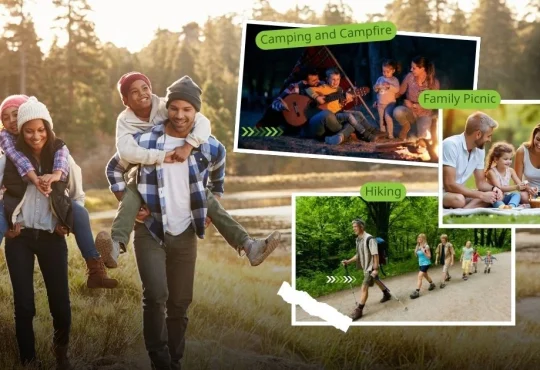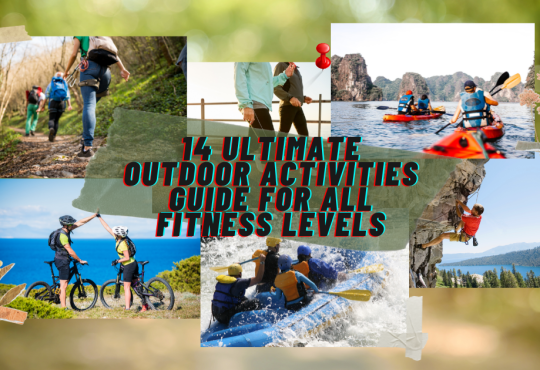Soccer, basketball, and tennis often dominate conventional ideas of sports, yet a quiet revolution is reshaping recreational activity in parks, backyards, and community spaces. Outdoor mini leagues for unconventional sports are emerging, providing fresh alternatives to traditional games. Activities such as frisbee golf, pickleball, and spikeball introduce new forms of movement, competition, and engagement, transforming ordinary spaces into dynamic areas for physical activity.
These leagues stand out due to their ability to combine ease of participation with dynamic and stimulating activities.
Skill levels across participants vary, but structured play allows improvement and friendly competition without the constraints of formal teams or long seasons. Beyond the physical benefits, these leagues promote social interaction, foster community connections, and activate local green spaces. Growing participation demonstrates that play can evolve beyond traditional rules, emphasizing creativity, energy, and collective enjoyment.
Top 3 Outdoor Mini Leagues for Fitness, Fun & Friends
Frisbee Golf
Frisbee golf, also known as disc golf, has evolved from a casual pastime into a full-fledged outdoor sport with a growing community of enthusiasts. Played on courses with designated “holes,” the objective is simple yet deceptively challenging: throw a disc from a tee area into a target with as few throws as possible. While the rules are easy to understand, mastering accuracy, distance, and strategy adds layers of skill that keep players returning week after week.
Mini leagues elevate the experience by providing structure, consistency, and a sense of camaraderie. Weekly matches, friendly rivalries, and small tournaments give both newcomers and seasoned players the chance to track their improvement, compete in a supportive environment, and build social connections. Beyond the competitive aspect, frisbee golf offers the unique bonus of being set in scenic outdoor locations—from forested parks and lakeside trails to urban green spaces—allowing players to combine exercise, fresh air, and nature appreciation. This blend of accessibility, challenge, and outdoor enjoyment makes frisbee golf leagues a perfect option for those seeking fun, fitness, and community all in one.
Pickleball
Pickleball has quickly become a favorite for players of all ages, thanks to its unique blend of tennis, badminton, and ping-pong. Its approachable rules and fast-paced gameplay make it easy for beginners to pick up while still providing enough challenge for experienced players to refine their strategy and skills. The game’s balance of agility, precision, and quick reflexes keeps every match engaging and energetic, making it an ideal choice for recreational play or friendly competition.
Mini leagues have fueled pickleball’s growth even further, offering a structured environment where communities can come together regularly. Organized matches, rotating partners, and skill-based divisions allow players to compete in a way that’s both fair and fun, keeping newcomers motivated without intimidating them. Because pickleball courts are smaller than traditional tennis courts, the sport is highly versatile. It can be set up in public parks, community centers, or repurposed school gyms, promoting accessibility and inclusivity. Beyond the physical benefits, these leagues foster camaraderie and social interaction, creating a welcoming space where people can exercise, make friends, and enjoy a sense of community—all while discovering just how addictive this energetic, fast-moving sport can be.
Spikeball
Spikeball has quickly established itself as one of the most energetic and social outdoor sports. The game relies on fast reflexes, coordinated teamwork, and high-speed rallies, ensuring players stay actively engaged throughout. Using a small circular net and a bouncy ball, it’s simple to pick up yet offers enough challenge to keep participants coming back, turning every play into a thrilling mix of strategy and excitement. Mini leagues elevate spikeball’s thrill by providing a setting that is both organized and adaptable. Rotating teams not only keeps the games fresh but also fosters connections among players, creating a sense of community where friendships and rivalries grow side by side.
Its minimal equipment requirements and compact play area make it ideal for nearly any outdoor setting—from sun-soaked beaches and grassy neighborhood parks to urban plazas tucked between buildings. Add in the high-energy atmosphere, casual competition, and frequent social interaction, and spikeball becomes more than just a game—it’s a hub for physical activity, socializing, and playful competition that keeps players coming back week after week.
Why Mini Leagues Are Taking Off
The surge in popularity of mini leagues comes down to a perfect combination of fun, fitness, and flexibility. Unlike traditional sports leagues that can feel rigid, high-pressure, or time-consuming, mini leagues create a welcoming, low-stress environment where anyone—from beginners to seasoned players—can join in. They offer participants the chance to challenge themselves, track personal progress, and enjoy the thrill of friendly competition, all while fostering social connections that make each match more than just a game.
Another reason for their rapid growth is convenience. Mini leagues typically require minimal equipment, small playing areas, and short time commitments, making them ideal for modern schedules. Organizers benefit too: setting up a league is often straightforward, with little overhead, and it opens doors for community engagement, partnerships, and even sponsorships from local businesses looking to support health-conscious, active residents. Beyond physical activity, these leagues are becoming micro-communities—places where people meet, share experiences, celebrate victories, and bond over a shared love of unconventional sports. As a result, mini leagues are redefining recreational play, blending exercise, social life, and competition into a package that appeals to a broad audience.
Building Your League
Starting a mini league for an unconventional sport is easier than you might think—and it can be incredibly rewarding. Begin by rallying a core group of friends, coworkers, or neighbors who share an interest in trying something new. Choose a local park, school field, or community court that’s easily accessible and has enough space for your chosen sport. Once the location is set, establish a consistent schedule—weekly or biweekly matches help build momentum and give participants something to look forward to.
Technology can make the organizational side effortless. Community boards, social media groups, and platforms like Meetup or TeamSnap make it simple to advertise your league, track sign-ups, and manage schedules. To keep the energy high and encourage friendly competition, consider introducing small incentives like themed match days, rotating teams, leaderboards, or even quirky prizes for sportsmanship or creativity. Over time, your mini league can evolve into more than just a game—it can become a vibrant community gathering point, attracting frisbee golfers, pickleball players, spikeball enthusiasts, and curious newcomers alike. With a little planning and creativity, your local park could transform into a lively hub where fun, fitness, and social connection intersect.
The Future of Outdoor Play
As lifestyles become busier and screen time continues to dominate, people are seeking ways to stay active that feel less like a chore and more like an experience. Outdoor mini leagues for unconventional sports answer that call perfectly. Unlike traditional sports that often require strict schedules, specialized equipment, or large teams, these leagues are flexible, accessible, and designed for fun. They challenge players physically and mentally—whether it’s strategizing your next frisbee golf throw, reacting quickly in a fast-paced spikeball rally, or perfecting a pickleball serve—while also nurturing social bonds in ways that solo workouts or gym sessions simply can’t.
These leagues also encourage inclusivity, welcoming participants of all ages and skill levels. Beginners can jump in without fear of judgment, while more experienced players can test their skills in friendly competition. The outdoor setting adds another layer of appeal, allowing people to soak in fresh air, enjoy scenic parks, or even explore urban spaces in new ways. Looking ahead, as communities prioritize health, social engagement, and creative forms of recreation, outdoor mini leagues are poised to become a cornerstone of modern play. Whether you’re a casual thrower, a competitive spinner, or a net-chasing enthusiast, there’s a league ready to transform your weekends into memorable, action-packed adventures.
Frisbee Golf
Frisbee golf—or disc golf—has grown far beyond a casual weekend pastime. Played on courses with designated “holes,” the goal is simple: land a disc in the target in as few throws as possible. While easy to learn, mastering distance, accuracy, and course strategy keeps players returning week after week.
Mini leagues add organization to frisbee golf by providing regular weekly matches, small-scale tournaments, and friendly competitions that foster both skill development and community connections. Many courses are set within natural surroundings—forests, lakesides, and urban parks—infusing the game with a peaceful, nature-filled element. Participants benefit not just from physical exercise but also from the focus and calm required to navigate a scenic, challenging course. For many players, these leagues offer a unique combination of fitness, social engagement, and outdoor adventure all in one rewarding experience.
Pickleball
Pickleball has quickly risen to become one of the most rapidly expanding sports in recent years. A mix of tennis, badminton, and ping-pong, it’s known for its quick reflexes, strategy, and social energy. Mini leagues have played a pivotal role in its growth, providing organized play that balances competitiveness with approachability. Rotating partners, skill-based divisions, and scheduled matches allow players of all levels to participate and improve while enjoying the social aspects of the sport.
Smaller courts make pickleball highly versatile, easily accommodated in parks, gyms, or repurposed school facilities. Leagues emphasize inclusion, ensuring that beginners feel welcome and veterans can still challenge themselves. Beyond exercise, mini leagues foster friendships, community bonds, and playful rivalries that transform casual court time into an energetic social experience.
How Mini Leagues Transform Fitness and Fun
Outdoor mini leagues for unconventional sports have grown into more than just a passing trend—they’re reshaping how people approach fitness, fun, and social connection. By breaking away from traditional sports, these leagues welcome participants of all ages and skill levels, creating spaces where anyone can learn, compete, and enjoy the game. Whether it’s the precision required in frisbee golf, the fast-paced energy of pickleball, or the reflex-driven excitement of spikeball, there’s something for everyone to enjoy.
What makes these leagues truly special is how they combine movement with community. They turn ordinary parks, fields, and courts into lively hubs where friendships form, rivalries spark, and every match feels like a shared adventure. The takeaway is simple: step outside, grab a disc, paddle, or ball, and dive in. You might find that these mini leagues offer your new favorite way to stay active, challenge yourself, and connect with others—all while having a blast.





